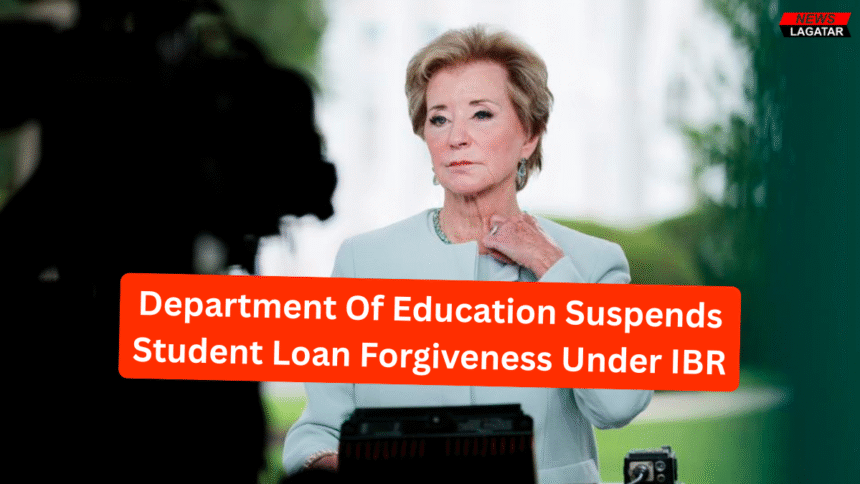IBR Student Loan Forgiveness Paused
The U.S. Department of Education has paused student loan forgiveness under the Income-Based Repayment (IBR) plan, leaving many eligible borrowers in limbo. While the IBR plan remains legally unaffected by ongoing lawsuits, the Department claims the pause is needed to update systems in light of broader student loan reforms. Here’s what’s happening, why it matters, and what borrowers can do now.
What is the IBR Plan and How Does It Work?
The Income-Based Repayment (IBR) plan is one of several income-driven repayment (IDR) options available to federal student loan borrowers. It calculates monthly payments based on the borrower’s income and family size and offers loan forgiveness after:
-
20 years of qualifying payments (for loans issued on or after July 1, 2014), or
-
25 years (for older loans before that date)
Unlike newer plans like SAVE or PAYE, IBR is authorized directly by Congress, making it more legally secure. This makes the current pause in processing forgiveness all the more frustrating for eligible borrowers.
IBR Forgiveness Paused, But Not Because of Legal Action
Contrary to what some may assume, the IBR pause is not due to a court injunction. Legal challenges targeting the SAVE plan and other Biden-era relief efforts have indeed created confusion—but IBR remains untouched by those lawsuits.
Still, the Department of Education has suspended IBR forgiveness, stating that:
“IBR forgiveness is paused while our systems are updated… Forgiveness will resume once those updates are completed.”
This vague explanation has sparked criticism from borrower advocacy groups, legal experts, and former Department officials alike.
SAVE Plan Injunction: The Source of Confusion?
In 2024, Republican-led states sued to block the SAVE plan, a new IDR option introduced by the Biden administration. A federal appeals court issued an injunction, halting parts of the SAVE plan, and raising legal questions about loan forgiveness under related plans like PAYE and ICR.
However, the IBR program is not covered by this ruling. Even the appeals court acknowledged that IBR is statutorily protected and not subject to any ongoing court case.
Despite this, the Department has paused IBR forgiveness, claiming the need to ensure accurate month counts and prevent overlaps with other paused plan.
Borrowers Are Stuck in a Forgiveness Limbo
Many borrowers have already completed the required 240 or 300 monthly payments under IBR. However, their loans have not been discharged. Former officials at the Office of Federal Student Aid confirmed that IBR forgiveness has been paused since July 2024, citing internal system delays and regulatory confusion.
This pause has financial consequences:
-
Borrowers continue to make payments unnecessarily
-
Interest continues to accrue
-
Some may lose trust in the Department’s student loan programs
In some cases, borrowers are being encouraged to switch to IBR from SAVE—only to find that IBR forgiveness is paused too.
Borrower Advocates Are Raising Alarm
The Student Borrower Protection Center and other legal aid groups have called out what they describe as “mismanagement” and policy manipulation. Executive Director Mike Pierce stated:
“Instead of fixing the broken student loan system, the Department is choosing to drown borrowers in unnecessary interest charges.”
The Department has resumed charging interest for borrowers under the SAVE forbearance program while simultaneously pausing IBR forgiveness. This dual action has left millions of Americans without a clear path forward.
Legislative Changes on the Horizon: The “Big, Beautiful Bill”
In July 2025, President Trump signed the “Big, Beautiful Bill”, a sweeping student loan reform law. This legislation includes:
-
Creation of a new IDR plan called RAP (Repayment Assistance Plan)
-
Eventual phase-out of SAVE, PAYE, and ICR
-
IBR remains for existing borrowers, but no new enrollments may be allowed later
-
RAP offers loan forgiveness after 30 years, significantly longer than IBR
This law raises concerns for future borrowers, especially those who might not qualify for the current IBR system before it’s phased out.
What Can Borrowers Do Now?
While there is no way to force the Department to process IBR forgiveness immediately, borrowers do have a few limited options:
1. Continue Payments Under IBR
You can keep making monthly payments under the IBR plan. If your forgiveness is eventually processed, any overpayments beyond the 240 or 300 months should be refundable. Keep detailed records of your payment history.
2. Request Forbearance
If you’re eligible for forgiveness but want to avoid unnecessary payments, you can request a forbearance. However, interest will continue to accrue, increasing your loan balance unless relief is processed soon.
3. Contact Your Loan Servicer
Loan servicers can provide updates, clarify your forgiveness status, and help you avoid errors in switching plans or missing critical documents.
4. Watch for Department Updates
The Department has promised that forgiveness processing will resume once their systems are updated. Follow the official Federal Student Aid website and borrower advocacy groups for the latest.
Key Takeaways for Student Loan Borrowers
-
The pause on IBR forgiveness is not court-mandated, but due to internal system updates.
-
Borrowers who have completed 20 or 25 years of qualifying payments are still waiting for their discharges.
-
New legislation (RAP plan) could reshape income-driven repayment in the near future.
-
Continue tracking your payment count, loan servicer communication, and official guidance to stay prepared.
Final Thoughts: Borrower Uncertainty Persists
Despite legal protections and decades of repayment, borrowers under IBR are once again left wondering when or if their loans will be forgiven. The lack of transparency from the Department of Education and the overlap of legal, technical, and political issues have created a crisis of confidence in the student loan system.
As new legislation rolls out and legal battles continue, one thing is clear: borrowers deserve clear timelines, legal consistency, and financial fairness. Until then, IBR forgiveness remains in a state of uncertain pause.






